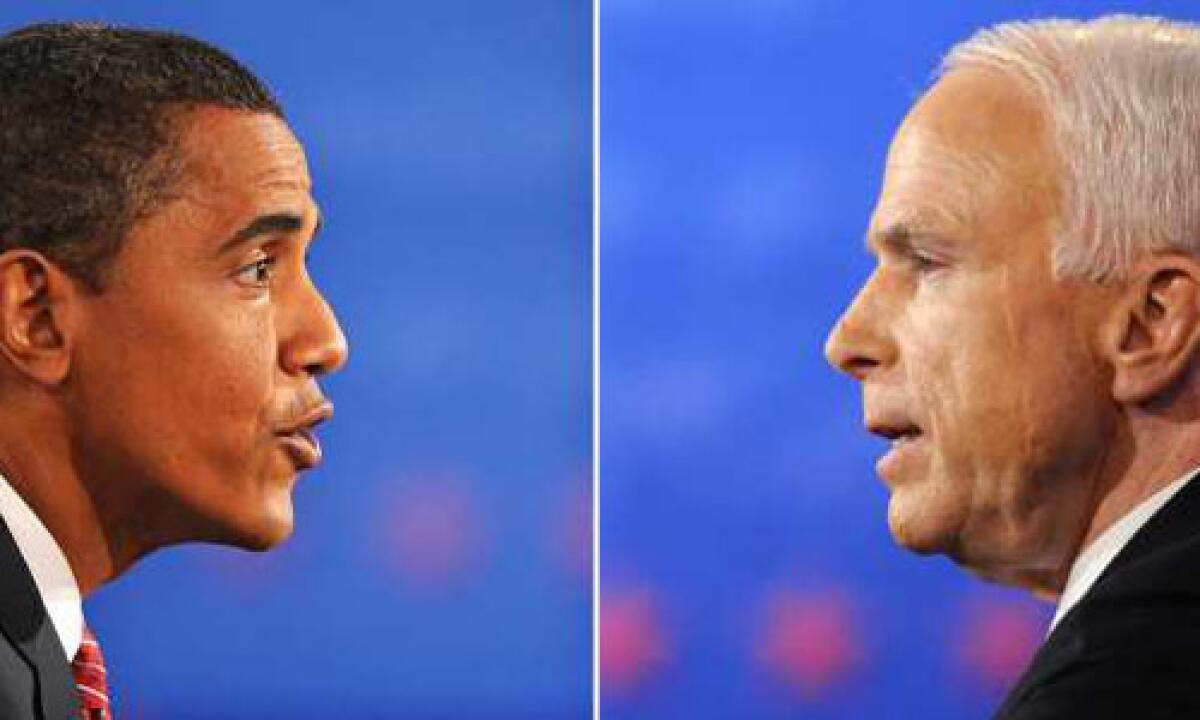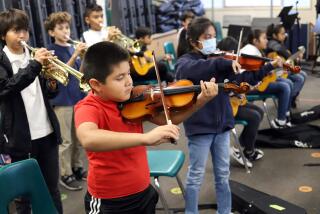Obama, McCain and the arts

- Share via
Artists, always a vocal bunch, have had a lot to say about this year’s presidential campaign. They’ve incorporated references to Barack Obama and John McCain into songs, online videos and even street art.
But what do the nominees have to say about the arts?
Democrat Obama has spoken about the importance of the arts often on the campaign trail, and his official party platform includes a two-page arts policy statement that calls for increased government funding for the National Endowment for the Arts. Republican McCain has been practically mum on the issue, although two weeks ago his campaign released a four-sentence statement that calls for funding for arts education to be left to local entities, where “local priorities allow.”
“There’s a philosophical difference there,” said Narric Rome, director of federal affairs for Americans for the Arts Action Fund, a Washington-based advocacy group that recently issued a report card on the presidential nominees’ positions on arts and arts education.
“We are looking for a president to champion arts education and champion that from a federal level,” he said, adding that McCain’s proposal “falls short of that.”
The organization, which will not endorse for president, based its report on the nominees’ voting records on arts-related legislation in the Senate and on their official statements about the arts.
In May 2007, as the primary race was just heating up, the organization asked all of the major candidates to submit in writing their official stance on arts and arts education. At the time, Obama, Democratic Sen. Hillary Rodham Clinton and Republican Mike Huckabee, former Arkansas governor, were quick to submit proposals.
Obama’s was the most detailed, Rome said. The Illinois senator formulated it with the help of his 33-person National Arts Policy Committee, whose members include Michael Chabon, the Pulitzer Prize-winning novelist, and George Stevens Jr., founder of the American Film Institute.
According to Rome, McCain never submitted an arts policy proposal; his campaign released its statement on arts education after 18 months of prodding.
The Arts Action Fund was pleased to get McCain’s official language, Rome said, but the group was disappointed that it calls for a limited federal role in advocacy for the arts.
Although McCain has voted repeatedly to cut funding for or terminate the National Endowment for the Arts, his stance, Rome said, is not necessarily anti-art but rather anti-big-government. In his statement, McCain says, “arts education can play a vital role fostering creativity and expression.”
Still, Elizabeth Currid, assistant professor at the USC School of Policy, Planning and Development, said McCain’s near silence on the issue shows “indifference” toward the arts. “No one says they don’t support the arts,” she said. “But they say it implicitly.”
Obama’s proposals, Currid said, lay out plans to bolster the arts with federal money and programs and show the nominee has “put his left foot forward” to support the arts.
Among other things, his proposal calls for the creation of an “Artists Corps” of young artists trained to work in low-income schools. Obama has also vowed to overhaul the No Child Left Behind Act, which, studies have found, has resulted in decreases in arts education in schools.
Rome said Obama was the first presidential candidate to have a national arts policy committee. “That’s significant,” he said. “That is not a fundraising arm. It was built to be a policy committee. Artists not only are being used as part of the campaign but also to further art policy.”
Currid acknowledged that the nominees’ positions on the arts probably wouldn’t be a deciding factor in November.
“No one thinks that arts is the top of the agenda in a presidential campaign,” she said. “But taking a first step is important.”
Linthicum is a Times staff writer.
More to Read
The biggest entertainment stories
Get our big stories about Hollywood, film, television, music, arts, culture and more right in your inbox as soon as they publish.
You may occasionally receive promotional content from the Los Angeles Times.











